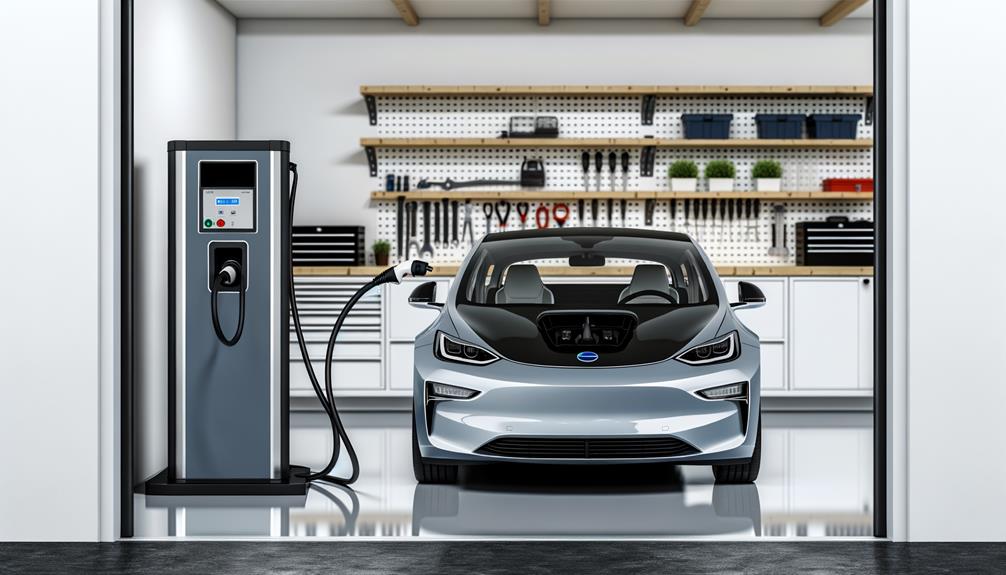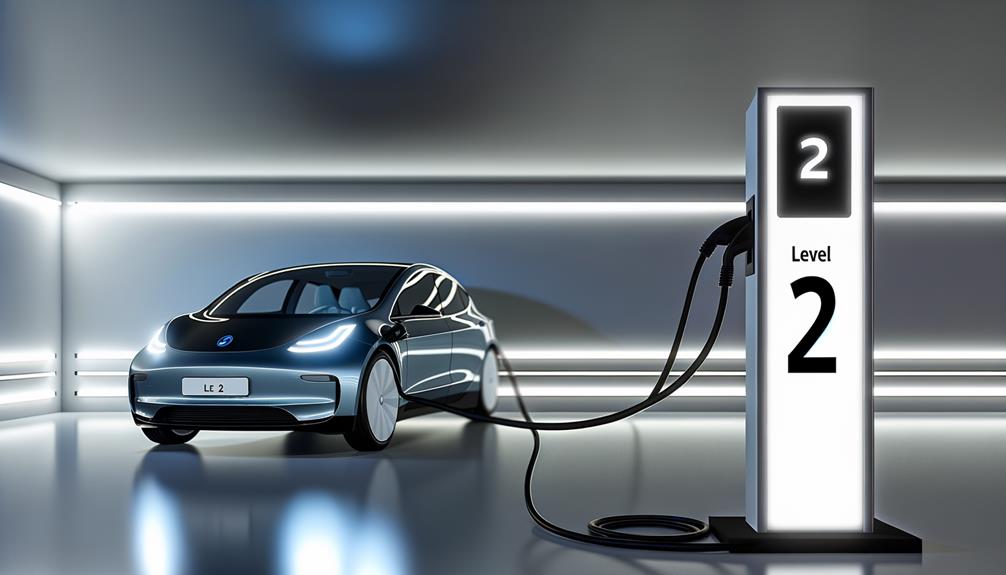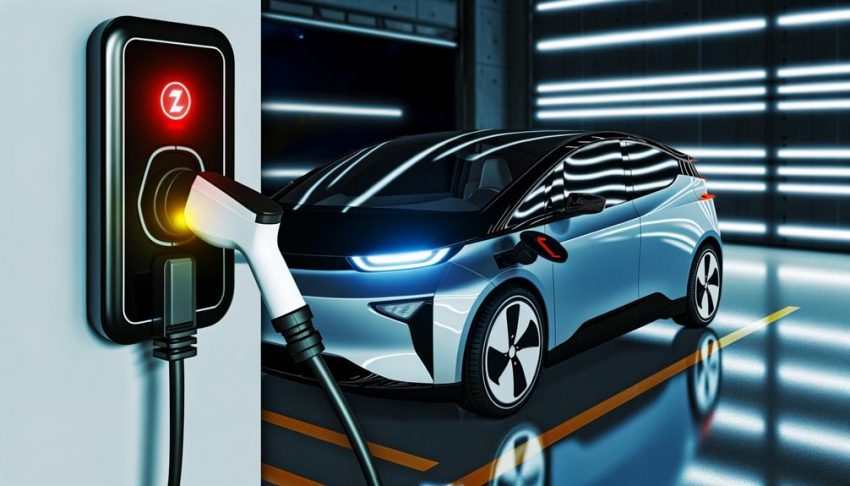So, you've been hearing about Level 2 electric car chargers but aren't quite sure what sets them apart? Fundamentally, these chargers operate on a standard 240V outlet, delivering a significant boost in charging speed compared to Level 1 chargers. They can add roughly 20 to 30 miles of range per hour, making them a practical choice for both home and public use. But what about the installation process and costs involved? Understanding these aspects could help you decide whether making the switch to a Level 2 charger is the right move for your electric vehicle needs.
Contents
Definition of Level 2 Charger
A Level 2 charger is a critical component in the infrastructure of electric vehicle (EV) charging, operating on a standard 240V outlet similar to those used for household appliances like clothes dryers. This charger type is specifically designed to provide faster charging capabilities compared to Level 1 chargers, delivering between 3kW and just under 20kW of AC power to EVs. As a result, Level 2 chargers can add approximately 30 to 50 kilometers (20 to 30 miles) of range per hour of charging, making them highly efficient for both home and public charging scenarios.
The Level 2 charger stands out due to its compatibility with most electric vehicles on the market. It typically features an SAE J1772 connector, which is the standard for EV charging in North America, ensuring seamless integration with a wide range of EV models. For Tesla owners, an adapter allows use of the same infrastructure, further extending its utility.
When considering installation needs, Level 2 chargers offer flexibility. They come in various designs, including wall-mounted and all-in-one units, to accommodate different environmental and spatial requirements. Wall-mounted units are popular for residential installations, providing a permanent and convenient solution for overnight charging, while all-in-one units might be preferred in public charging stations for their ease of use and extensive features.
Charging Speed
Understanding the definition and components of Level 2 chargers sets the stage for examining their charging speed, a key performance metric. Level 2 chargers deliver AC power between 3 kW to just under 20 kW, greatly enhancing charging speeds compared to Level 1 chargers. This increased power output means you can expect to add approximately 20 to 30 miles of range per hour to your electric vehicle (EV). Such efficiency reduces the charging time required for a full charge, making Level 2 chargers a compelling option for both home and public EV charging stations.
When analyzing charging speeds, the power output of the Level 2 charger and your EV's battery capacity are vital factors. For example, a typical 40 kWh battery will take about 13.3 hours to reach a full charge at a 3 kW output but only 1.8 hours at 22 kW. This variability underscores the importance of matching the charger's output to your EV's acceptance rate for optimized charging time. It's worth noting that higher output chargers can greatly diminish the time spent charging, making them ideal for drivers requiring faster charging capabilities.
In practical terms, Level 2 chargers' ability to add 15 to 30 miles of range per hour is a game-changer. Whether you're charging at home overnight or using public EV charging stations during a short stop, the faster charging speeds offer unparalleled convenience. This efficiency guarantees minimal downtime and maximizes the utility of your EV, enabling more extended travel ranges and frequent usage without the prolonged charging periods associated with lower power outputs.
Cost of Level 2 Charger

When considering the cost of a Level 2 charger, it is essential to account for both the hardware and installation expenses. Hardware costs for a Level 2 charger typically range from $300 to over $1,000, depending on the features and brand. This variance allows you to select a charger that fits your budget and meets your electric vehicle's charging needs.
Installation costs can greatly impact the overall expense. Hiring an electrician is often necessary, with costs starting at around $300. The complexity of the installation can cause this figure to rise, especially if electrical upgrades are required. On average, the initial installation cost for a Level 2 charger is estimated to be around $1,000, although subsequent installations might be cheaper due to pre-existing infrastructure.
| Expense Type | Cost Range | Notes |
|---|---|---|
| Hardware Costs | $300 – $1,000+ | Varies by features and brand |
| Installation Costs | Starting at $300 | Depends on location and complexity |
| Initial Installation | Around $1,000 | May be reduced for additional chargers |
| Charging Cost (Full) | About $6 per charge | Based on average electricity rates |
Understanding these costs can help you plan your budget effectively. Additionally, various local, state, and utility incentives may be available to offset the purchase and installation costs. These incentives are designed to promote the wider adoption of electric vehicles by making Level 2 chargers more affordable.
Installation Considerations
While evaluating the costs, it's equally important to contemplate the installation requirements for a Level 2 charger. A Level 2 EV charger demands a 240V power supply, similar to what's used for major household appliances like clothes dryers. This often necessitates modifications to your existing electrical panel to safely accommodate the charger.
You'll want to engage certified electricians for the installation. Not only does this guarantee the work is completed to industry standards, but it also assures compliance with local electrical codes. Safety is paramount, and a professional installation mitigates risks such as electrical fires or improper wiring.
Financial incentives can considerably reduce your out-of-pocket expenses. Look into available tax credits, rebates, and grants to offset installation costs. These incentives can make the installation of a Level 2 EV charger more financially viable.
When planning the installation, consider setting up customizable charging schedules. This feature can optimize your charging times to coincide with lower electricity rates, ultimately saving you money on your utility bills.
Future-proofing your wiring is another critical consideration. By installing wiring that can handle higher charging speeds or additional chargers down the line, you're preparing for technological advancements and future needs. This foresight can save you from costly upgrades later.
Compliance with local codes and standards isn't just a formality; it's a necessity for guaranteeing your installation is legally sound and insurable. Make sure your electrician is well-versed in these requirements.
Benefits of Level 2 Charging

Leveraging a Level 2 electric car charger offers substantial advantages over its Level 1 counterpart, particularly regarding efficiency and convenience. One of the most significant benefits is the reduction in range anxiety. Level 2 chargers can deliver approximately 30 to 50 kilometers (20 to 30 miles) of range per hour, making reliable home charging a reality. This capability is particularly advantageous for daily commuters who need their electric vehicle (EV) ready to go each morning.
For those with multiple vehicles, Level 2 chargers provide the convenience of fully charging an EV battery overnight. This rapid charging capability contrasts sharply with Level 1 chargers, which require much longer periods to achieve a full charge. Consequently, you can maintain a flexible and efficient charging schedule, ensuring all your vehicles are ready when needed.
From a sustainability perspective, utilizing Level 2 charging aligns with green energy goals by reducing reliance on gasoline. This contributes to a more sustainable transportation system, helping you lower your carbon footprint.
Additionally, Level 2 chargers come equipped with smart appliance functionality. This feature allows you to schedule charging during off-peak electricity rates, resulting in significant cost savings on your energy bills. Enhanced by mobile app controls, these chargers enable seamless management and tracking of charging sessions for multiple vehicles, thereby optimizing your user experience.
Frequently Asked Questions
What Is the Difference Between a Level 1 and Level 2 EV Charger?
You'll notice a significant difference in charging speed and power output. Level 2 chargers offer faster charging, higher energy efficiency, and greater convenience for home and public charging, but they come with higher installation costs and maintenance requirements.
Is a Level 2 Charger Worth It?
Yes, a Level 2 charger's worth it. The cost benefits, faster charging speed, and home convenience outweigh the higher installation process expense. It's energy-efficient, compatible with most electric vehicles, and offers long-term savings and a better user experience.
What Does a Level 2 Charger Plug Into?
A Level 2 charger plugs into a 240-volt electrical outlet, commonly found in homes and public charging stations. Considering charging speed, installation requirements, and energy efficiency, it's compatible with various charger types, adhering to safety standards, though cost comparison varies.
Can All Electric Cars Use Level 2 Chargers?
Yes, most EV models can use Level 2 chargers, but compatibility factors like charging speeds and battery health vary. Home installation and public charging are common, with cost considerations and charging networks influencing the user experience and future trends.
Conclusion
In conclusion, a Level 2 electric car charger is a robust solution for efficient EV charging, leveraging a 240V outlet to deliver 3 kW to 20 kW of AC power. You'll experience faster charging speeds, adding 30 to 50 kilometers per hour, which greatly minimizes downtime. While installation requires some considerations, the investment in a Level 2 charger pays off in enhanced convenience and compatibility with most EVs via the SAE J1772 connector. Ultimately, it's an ideal choice for both home and public charging needs.
